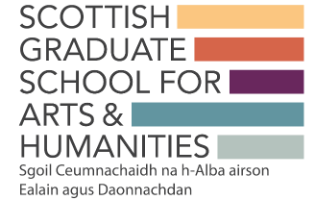Historic Environment Scotland - Saving our skills: useful methodology for a heritage skills at risk list
Published: 4 October 2024
This internship will involve working with Historic Environment Scotland (HES) to collect and analyse secondary and primary data to aid HES' approach to assessing the ‘health’ of specialist heritage skills and understand the full scale of the risk across all areas of conservation practice
Historic Environment Scotland: Saving our skills: useful methodology for a heritage skills at risk list
Apply for this SGSAH-funded internship with Historic Environment Scotland, up to 12 weeks FTE, between January & October 2025.
The project is titled Saving our skills: useful methodology for a heritage skills at risk list and will involve exploratory work to research which specialist heritage skills are currently at risk
Deadline for Applications is 15th November 2024.
Location
This will be agreed between the intern and their mentors depending on the preference of the intern. It could be fully remote, fully in person at the Engine Shed in Stirling or Longmore House in Edinburgh or a hybrid approach
Project
The project is titled "Saving our skills: useful methodology for a heritage skills at risk list".
The refreshed Skills Investment Plan for the historic environment (SIP) was published in April 2024 following extensive consultation with sector organisations, training providers and key stakeholders. It is a collaborative framework for collective action and identifies priorities and where resource needs to be invested. During the consultation, it was identified that we needed a process to assess the ‘health’ of specialist heritage skills to help us to identify, monitor and act on those at risk.
For example, there are areas of conservation practice where the number of professionals with the required knowledge and skills to care for many collections is vanishingly small, meaning that any, even small, decline in the size of the workforce is likely to have a significant impact on our ability to protect and preserve such collections. For example, there are just seven fully qualified conservators, many of whom are approaching retirement age.
Unless urgent action is taken to understand the full scale of the risk across all areas of conservation practice and other specialisms within the heritage sector, we are likely to lose skills and knowledge that have taken decades to acquire without realising it.
In addition to HES and Icon partners involved in this project include English Heritage, Historic England, Communities NI and the Chartered Institute of Archaeologists.
We would like to offer an internship to do some exploratory work on what a methodology might look like to aid the partnership’s thinking. There are some useful models to explore most notably the Icon LMI toolkit and the heritage crafts association red list but there may be others we can learn from.
The ability to be able to identify skills at risk, assess the level of risk and the potential impact is vital to all the historic environment sector partners to aid skills planning, for advocacy and support the development of collective interventions.
It is envisaged that this work will consist of collecting and analysing secondary and primary data.
Primary data collection through conversations with key stakeholders including the Heritage Crafts Association that run the red list of heritage skills at risk to understand their approach and the limitations, and key stakeholders to understand what they are needing from a heritage skills at risk list.
Secondary data collection through desk-based research to review other methodologies, approaches and best practice examples which identify and analyse skills at risk, and support skills succession planning
The intern will be closely supported by their mentors and the partnership
Outputs
We want the researcher to produce a short report, including methodology, findings and recommendations as to what the methodology needs to look like, and present this to the partnership.
Timescale
Application Deadline: 15th November 2024
Start date (or must start by): Flexible
End date (or must end by): Flexible
Project can be worked full time, part time or flexibly in blocks
Benefits to the Researcher
The intern will benefit from the project by actively helping to understand and shape heritage skills at risk methodology, and by learning to apply their research skills within an applied situation. They will gain insight into the work of both HES, Icon, the other partner organisations and the wider historic environment sector, and gain contacts across the heritage and skills sector.
Key Relationships
HES. The researcher will work within the Strategy and Policy team, in the External Relations and Partnerships Directorate at HES, and work principally with the team co-ordinating delivery of the Skills Investment Plan. They will also work with HES colleagues working in their areas of interest.
Icon. The researcher will work with the Policy and Programmes Director and will focus on supporting the development of robust and reliable research to inform Icon’s skills development, policy and advocacy work.
There will also be opportunities to build relationships with a wide range of sector organisations, sector support bodies and education providers. We will be able to use this data to advocate for funders and commissioners to align skills development activity to sector need.
Person Specification
|
A1 – Knowledge Base |
C1 – Professional Conduct |
||||
|
|
X |
Subject Knowledge |
|
|
Health and Safety |
|
X |
|
Research methods – theoretical knowledge |
X |
|
Ethics, principles and sustainability |
|
X |
|
Research methods – Practical application |
|
|
Legal requirements |
|
X |
|
Information Seeking |
|
|
IPR and copyright |
|
X |
|
Information literacy and management |
X |
|
Respect and confidentiality |
|
|
|
Languages |
|
|
Attribution and co-authorship |
|
|
|
Academic literacy and numeracy |
X |
|
Appropriate practice |
|
A2 – Cognitive abilities |
C2 – Research management |
||||
|
X |
|
Analysing |
|
|
Research Strategy |
|
X |
|
Synthesising |
X |
|
Project planning and delivery |
|
X |
|
Critical thinking |
|
|
Risk management |
|
X |
|
Evaluating |
|
|
|
|
X |
|
Problem Solving |
|
|
|
|
A3 – Creativity |
C3 – Finance, funding & resources |
||||
|
X |
|
Inquiring minds |
|
|
Income and funding generation |
|
X |
|
Intellectual insight |
|
|
Financial management |
|
X |
|
Innovation |
|
|
Infrastructure and resources |
|
X |
|
Argument construction |
|
|
|
|
|
|
Intellectual risk |
|
|
|
|
B1 – Personal qualities |
D1 – Working with others |
||||
|
X |
|
Enthusiasm |
X |
|
Collegiality |
|
X |
|
Perseverance |
X |
|
Team working |
|
X |
|
Integrity |
|
|
People management |
|
|
|
Self-confidence |
|
|
Supervision |
|
X |
|
Self-reflection |
|
|
Mentoring |
|
|
|
Responsibility |
|
|
Influence and leadership |
|
|
|
|
X |
|
Collaboration |
|
|
|
|
X |
|
Equality and diversity |
|
B2 – Self management |
D2 – Communication & dissemination |
||||
|
X |
|
Preparation and prioritisation |
X |
|
Communication methods |
|
X |
|
Commitment to research |
X |
|
Communication media |
|
X |
|
Time management |
|
|
Publication |
|
|
|
Responsiveness to change |
|
|
|
|
X |
|
Work-life balance |
|
|
|
|
B3 – Professional & career development |
D3 – Engagement and impact |
||||
|
|
|
Career management |
|
|
Teaching |
|
|
|
Continuing professional development |
|
|
Public Engagement |
|
X |
|
Responsiveness to opportunities |
|
|
Enterprise |
|
X |
|
Networking |
|
|
Policy |
|
X |
|
Reputation and esteem |
|
|
Society and culture |
|
|
|
|
|
|
Global citizenship |
Apply here
Return to the Internships & Artists Residencies 2025 page to see other internship opportunities.
First published: 4 October 2024



